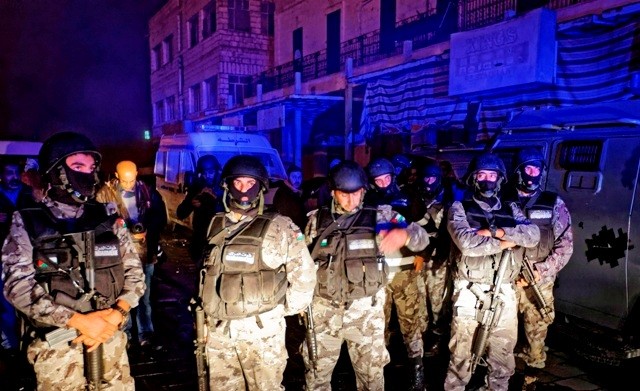Sending a message to Islamic terrorists, Jordan hangs 10 people, including five Islamic terrorists.
Jordan executed 10 prisoners with ties to Islamic terrorism who carried out five shootings and a bombing since 2003, on Saturday, the government spokesman said. It was the largest round of executions in the Kingdom in at least a decade.
Among those killed in the attacks were a British tourist, an outspoken Jordanian critic of Islamic extremism, and members of the Jordanian security forces.
Saturday’s executions were the first since pro-Western Jordan launched a crackdown on Islamic terrorists two years ago, in response to the killing of a captured Jordanian fighter pilot by the Islamic State (ISIS) group. Jordan is part of a US-led military coalition against ISIS, which holds territory in Syria and Iraq, on Jordan’s borders.
The prisoners were hanged at dawn Saturday at Swaqa Prison, about 75 kilometers (47 kilometers) south of the capital of Amman, said government spokesman Mohammed Momani.
Momani said the executions signal that, “Those who commit terrorism and threaten our national security will find the same destiny.”
Five others were hanged Saturday for other crimes, including incest, Momani said in a statement carried by the state news agency Petra.
The terrorists executed Saturday for terror convictions were involved in six different incidents, from a 2003 bombing attack that killed 19 at Jordan’s embassy in Iraq to the September 2016 shooting of local writer Nahed Hattar on the steps of an Amman courthouse.
Also listed were a 2006 shooting attack on a group of tourists at a Roman theater in Amman in which a 30-year-old British man was killed; a December 2015 shooting attack that killed two police officers; a March 2016 shootout between police and ISIS terrorists at their hideout in which an officer was killed; and a June 2016 attack by a lone gunman on an office of Jordan’s intelligence agency that killed five.
Nahad Hattar, the writer, had been on trial for posting a cartoon deemed offensive to Islam on social media when a terrorist killed him outside the courthouse. The terrorist was a former mosque prayer leader motivated by anger over the cartoon, officials said at the time.
Generators of terrorism go unpunished
Saad Hattar, a cousin of the victim, said Saturday that while the killer was punished, those who instigated such attacks with hateful rhetoric were not.
“The murderer was just a tool, and our society needs the uprooting of the ideology and the culture behind him,” Hattar, a journalist, told The Associated Press.
Analyst Labib Kamhawi said he believes the executions were intended as a deterrent and also as a message to ordinary Jordanians buckling under price increases that their country faces a serious security threat.
The message to the international community, particularly the Trump administration, is that “Jordan is on top of things and that Jordan can be considered one of the allies in fighting terrorism,” Kamhawi said.
Jordan intensified its campaign against suspected Islamic terrorists after ISIS released a video in early 2015, showing its terrorists as they burned to death the fighter pilot trapped in a cage. In response to the video, Jordan executed two prisoners linked to the al-Qaida terror network, a precursor of ISIS.
Hundreds of Jordanians have been detained or sentenced to prison since then, including those expressing support for ISIS on social media.
Jordanian authorities have dismissed support for ISIS in the kingdom as a fringe phenomenon and said security forces can contain any threat. However, there has been a rise in attacks in Jordan linked to Islamic terrorists over the past year.
Jordan executed 11 people in December 2014, in cases involving murder. This ended what had been a de facto eight-year moratorium on the death penalty.
Executions condemned by human rights groups
Two human rights groups, Amnesty International and Human Rights Watch, said Saturday the death penalty is not an effective deterrent.
The “horrific scale and secrecy” of Saturday’s executions was shocking, said Samah Hadid, deputy director of Amnesty International’s regional office in Beirut.
“This is a major step backward for both Jordan and efforts to end the death penalty, a senseless and ineffective means of administering justice,” she said.
By: AP





